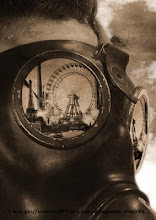My body is made out of about 70 % water, from diverse sources. The biomolecules that remain have been accumulated and derived from food coming from all over the world. My body contains about 10 times more non-human cells (bacterial & other microbes) than human cells. And there are about ten times more viruses in my body (mostly against bacteria) than bacteria. There are more then 100 x more non-human than human genes in me. Even each human cell contains an ancient bacterium (mitochondria) that gives me all my energy. The non-human organisms in me and on my skin govern what diseases I get, how fat I become, and what food I crave. It is known that biomolecules produced by my body's microbes affect my brain. In fact, we only begin to understand how much of my life & actions are largely determined by my microbes. For example, animal studies (in fruit flies) have shown that microbes also determine the choice of partner...
Moreover, most of my actions and reactions are heavily influenced by non-verbal communication (mostly unnoticed by me) between me and fellow humans, and - through epigenetics - also by strong life events experienced by my parents and even their parents. Typically, my brain only justifies a posteriori an action that has been decided beforehand, elsewhere.
Who am I - who are we?
Joyeux Noël ! Merry Christmas !
10 years ago
